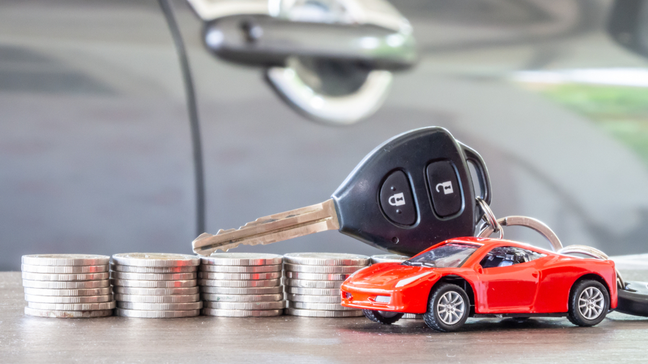Financing a car isn’t unlike taking out a mortgage. The principal is lower, but lenders will still take a peek at your credit score to see how much interest they should charge to compensate for the risk of lending to you.
So what is a credit score? What credit scoring system do auto lenders use? Whether your credit score is 350 or 800, how can you improve your lending terms and save thousands on interest?
Let’s investigate credit scores and car loans.
What’s Ahead:
What credit scoring system do auto lenders use?
Although everyone uses the same rough scale (300 to 850), different agencies calculate their version of your credit score differently. Your Equifax Credit Score, for example, might differ from your FICO score.
In this article, I’m going to focus on your FICO score. It’s what most institutions use and is heavily favored by auto lenders for being accurate, widely used, and constantly innovated upon. For example, the 64-year-old company recently debuted the UltraFICO score, a next-gen credit score that combs through more variables and offers a meatier suite of tools for achieving and maintaining prime credit.
Until the UltraFICO becomes standard, the vanilla FICO score works just fine for 90% of lenders. Here’s precisely how your FICO score is calculated:
FICO Score Factor Description % of total
Payment history Whether you pay your bills on time 35
Total Amount Owed Debts plus percentage of your credit you’re using 30
Length of Credit History Length of time you’ve had credit 15
Types of Credit Variety of loans (mortgage, car, student, etc) 10
New Credit Recent hard credit pulls 10
Your bank’s online dashboard should let you check your FICO score for free. You can also use myFICO to estimate your FICO score in under a minute. You will need to pay a monthly fee (there are three different price options), but you get way more features than the free credit score apps.
The cheapest plan lets you check your FICO score specifically for auto loans, so you can rest assured that you know your exact score before walking into a dealership.
Now, what does your FICO score say about your viability to get an affordable car loan?
What FICO score is needed for a car loan?

If you’ve ever driven past a sketchy used car lot or watched The Price is Right on cable like I have, you’ve probably seen ads with marketing language like this:
“BUY HERE PAY HERE!”
“$0 DOWN!”
“BAD CREDIT? NO PROBLEM!”
They’re all indicators that if you can fog a mirror, you can get a car loan. It just won’t be a very good one. John Oliver did an exposé on predatory car loans that’s worth the 18-minute watch.
A better question is: what FICO score is needed for a good car loan? At what point should you instead focus on improving your credit first? Let’s dive in.
How does my credit score affect my auto loan terms?
Depending on your loan amount, raising your credit score by just a few points prior to purchase could save you thousands in interest.
You can tinker with Money Under 30’s Auto Loan Calculator to see how your pretend credit score could affect your loan terms on a $25,000 vehicle purchase, leased over 60 months.
Credit score APR Total interest paid on $25k loan over 60 months
Excellent (720+) 4.49% $2,958
Good (650-719) 7.65% $5.164
Subprime (550-649) 13.99% $9.895
From these numbers, you can see how your credit score can have a huge and pricey impact on your loan terms.
Low credit will likely drive up interest rates
If you have subprime (<650) credit, lenders will consider lending to you to be a higher risk. Therefore, they’ll charge you more interest to offset the risk.
As illustrated above, if you can raise your credit to above 720 before taking out an auto loan you could save thousands in interest.
Certain lenders may not offer you a loan at all
If you have subprime credit (or no credit at all), certain lenders may not even consider your case. On the flip side, however, improving your credit opens the door to better rates and better lenders.
By choosing to only lend to prime candidates, some lenders can afford to offer extremely low interest below 4%.
Oh, and here’s the thing about those “0% APR for 60 months” claims
You’ve probably heard claims that a dealer can offer you “0% APR for 60 months!” While technically true, 0% APR isn’t as good as it seems.
First, and perhaps not surprisingly, it typically only applies to buyers who have excellent credit already. For everyone else, it’s just a misleading way to lure you into the dealership, only to be disappointed at the point of financing.
Even if you do qualify for a 0% APR on a new vehicle, you may not be saving any money in the long run. As illustrated above, the total interest for someone with Excellent credit financing a $25k loan is around $3,000. If you’re offered a 0% APR loan on a new car, there are at least four possible realities as to why:
- The car is months away from being “last year’s model” and depreciating $4,000.
- The dealer has hidden $3,000 in fees somewhere in the walkout price.
- The car is terrible and nobody bought one so they need to make space.
- 0% APR is actually a good deal.
0% APR deals embody the old saying “if it sounds too good to be true, it probably is.”
In reality, you’ll probably negotiate a deal with your lender or take some time to improve your credit score. On that note, what are some concrete ways you can improve the terms of your auto loans?
How can I lower my interest rates?

If you have subprime credit, here’s a playbook of ways you can lower your interest rates.
Talk to the financier
Like auto insurance, auto loans are subjective, and financiers can be open to negotiation. Not all car buyers have subprime credit for the same reasons, and you can prepare a case for why you deserve prime credit interest rates without the score to support it.
For example, if your credit score got pummeled by your student loans but you’ve never missed a car payment, that’s music to an auto loaner’s ears. Similarly, if you’re in debt from starting a business but said business is paying you a steady salary, that’s also fodder for negotiating.
Find a cosigner
There may be someone in your life with a high credit score who’s willing to cosign with you on the auto loan. Cosigning on a loan takes tremendous trust, as the other person will be financially responsible if you can’t make payments.
However, you can make the case to them that you’ll remove them and refinance as soon as your credit score is high enough.
Make a larger down payment
It’s simple math; a smaller principal means less interest. The more cash you can plunk down, the more you’ll save on interest.
Improve your credit
Perhaps the best option is to simply take a few months or years to improve your credit score. With strategy and patience, it’s not impossible.
Taking time to improve your credit score will not only save you thousands on your auto loan, but could save you tens of thousands on your mortgage or other large loans down the road.
Finance a cheaper car, or don’t buy one at all
You should never spend more than 35% of your annual pre-tax income on a car. You can see how much car you can afford using MU30’s Car Affordability Calculator.
I personally own a luxury Japanese sedan worth $8,000 and a Japanese “fun” car worth $4,000. Both are paid off and cost $1,200 annually to insure. I want for nothing. Similarly, famous YouTube personality Scotty Kilmer spends most of his energy convincing viewers to buy less car than they think they need (he’s also a mechanic with 50 years of experience).
Point is, you can live a great life with a cheap, reliable car. Expensive cars are expensive to insure and maintain, and most of them depreciate like an open carton of milk. So consider lowering your budget, or better yet, not buying a car at all – that’s the best way I know of to achieve 0% APR.
Summary
Your credit score can have a huge impact on your auto loan terms. How big of an impact? Well, improving your credit score by just 100 points is near-guaranteed to save you thousands.
If you don’t have the time to improve your credit, you can still negotiate prime rates with subprime credit by making your case to a lender. Be prepared to explain why your credit is subprime, and show proof that you’re ready to make on-time payments throughout the lifetime of the loan.
Alternatively, you can also reduce your interest by simply spending less, finding a co-signer, or best of all, taking time to improve your credit.


